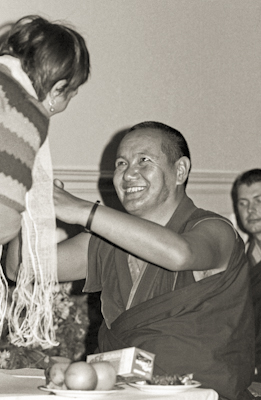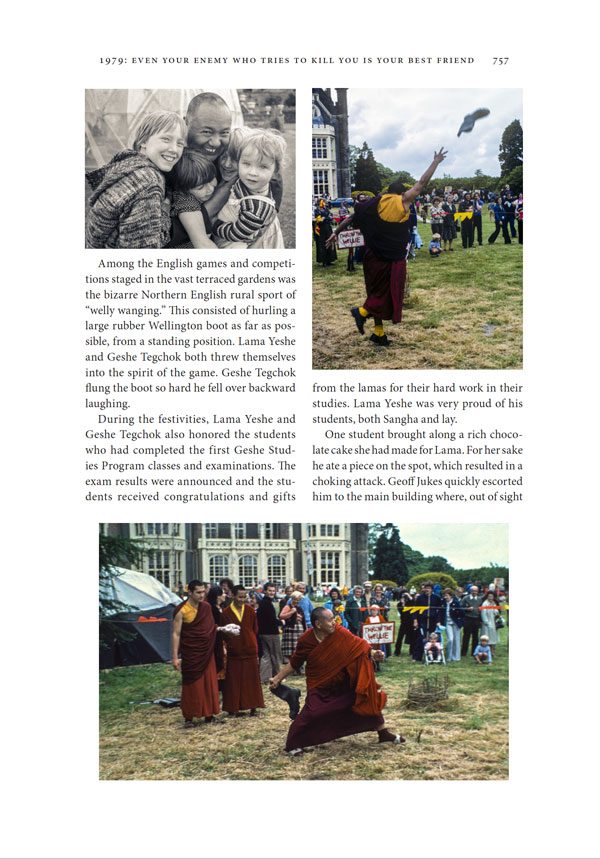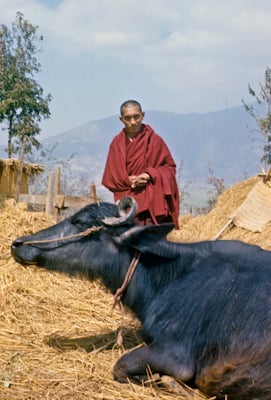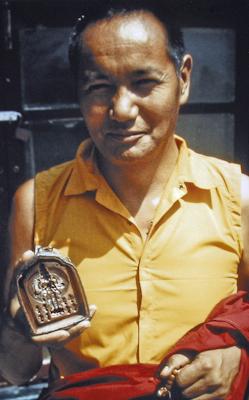Dear Friends,
Welcome to the April issue of our monthly e-letter. We hope you enjoy reading updates of our latest work that we undertake together, for the benefit of all beings everywhere. Please share!
On the LYWA Podcast: The Source of All Happiness
May the good heart, altruism, source of all the happiness, may it be generated within my mind, in the mind of the family, all sentient beings; those who have this altruism, bodhicitta, thought of full enlightenment to benefit others, to be developed due to all these merits, positive actions that one did in the past, in the present, future.
- Lama Zopa Rinpoche
 In this month’s podcast, Lama Zopa Rinpoche describes how the altruistic mind of enlightenment works and explains the great benefits from cultivating such a powerfully clear and pervasive mind. Rinpoche then explains in great detail how thought transformation practices are the very best way to deal with the inevitable stresses of modern life and the associated obstacles that repeatedly arise like waves as we move towards the mind of enlightenment for the sake of all beings. These teachings were given by Rinpoche in Bendigo, Australia, August, 1991. You can read the transcript of the teachings on our website.
In this month’s podcast, Lama Zopa Rinpoche describes how the altruistic mind of enlightenment works and explains the great benefits from cultivating such a powerfully clear and pervasive mind. Rinpoche then explains in great detail how thought transformation practices are the very best way to deal with the inevitable stresses of modern life and the associated obstacles that repeatedly arise like waves as we move towards the mind of enlightenment for the sake of all beings. These teachings were given by Rinpoche in Bendigo, Australia, August, 1991. You can read the transcript of the teachings on our website.
The LYWA podcast contains hundreds of hours of audio, each with links to the accompanying lightly edited transcripts. See the LYWA podcast page to search or browse the entire collection by topic or date, and for easy instructions on how to subscribe.
From the Video Archive: Laughing with Lama
Because Lama is a bodhisattva, even talking in an ordinary way when Lama says something, laughs, makes a joke, it gave so much happiness in the other’s mind. Somebody might think, "Oh that doesn’t have much meaning" but the reality is that just a few words and a laugh from Lama have great benefit for some people. Their heart becomes totally transformed from the depression, the life that made them so unhappy. That is how Buddha and bodhisattvas guide sentient beings.
-From Lama Zopa Rinpoche's foreword to Big Love: The Life and Teachings of Lama Yeshe.
This brilliant laughter happened during Lama Yeshe's teachings on the Six Yogas of Naropa at Boulder Creek, California, 1983. Audio enhancement by John Paterno. The laughter is set to images from teachings given by Lama at Lake Arrowhead, California, 1975. Photography by Carol Royce-Wilder. Video editing by Megan Evart.
Visit and subscribe to the LYWA YouTube channel to view dozens more freely available videos from our archive.
WHAT'S NEW ON OUR WEBSITE
 Recently posted to our website is a teaching on the four immeasurables excerpted from A Commentary on the Yoga Method of Divine Wisdom Manjushri, given by Lama Yeshe at Manjushri Institute, Cumbria, England, in August 1977. Edited by Nicholas Ribush.
Recently posted to our website is a teaching on the four immeasurables excerpted from A Commentary on the Yoga Method of Divine Wisdom Manjushri, given by Lama Yeshe at Manjushri Institute, Cumbria, England, in August 1977. Edited by Nicholas Ribush.
This month's new additions to Lama Zopa Rinpoche's Online Advice Book include:
- Experience the Sickness for All Sentient Beings: This advice was given to a student who had worked for many years helping Rinpoche and who suddenly became very sick and was in hospital.
- Attachment to the Guru: A student asked Rinpoche how to recognize whether their attachment to their guru, who was a lay person, was positive or was coming from a deluded mind.
- The Most Important Practice: Rinpoche recommended an essential daily practice for a student who had distanced themselves from Rinpoche and FPMT for many years and wanted to reconnect.
- Grief After Baby’s Death: A student had been grieving for many years after her child had died at birth. She asked Rinpoche for advice on how to deal with situation.
On our website, you can always find a list of all the newly-posted advices from Lama Zopa Rinpoche.
BIG LOVE UPDATE
 The book is progressing nicely and we are well into the design phase. We are looking at two hardcover volumes of over 700 pages each, with an average of a photo a page, so it's taking a bit of time to get everything right. If you would like to contribute to this beautiful project, please do so here. Thank you so much!
The book is progressing nicely and we are well into the design phase. We are looking at two hardcover volumes of over 700 pages each, with an average of a photo a page, so it's taking a bit of time to get everything right. If you would like to contribute to this beautiful project, please do so here. Thank you so much!
Thank you so much for your kind support, which makes it possible for us to spread the Dharma freely for the benefit of all sentient beings. This month we bring you a couple of teachings by Lama Zopa Rinpoche on why we should not eat animals. Personally, I think simply not eating animals is not enough, as I expressed in my article On Becoming a Vegan, which contains a link to Rinpoche's thoughts on the subject about ten years ago. Recently we heard that Rinpoche himself has now become a vegan.
Much love,

Nick Ribush
Director
THIS MONTH'S TEACHING: Why Be a Vegetarian
In these excerpts, Rinpoche asks us to abandon eating meat and become vegetarian, and to take good care of animals in other ways.
From a teaching on August 24, 2013
 An announcement. When I was sick, when I got a stroke and was in the hospital, I was watching TV. On TV they talked about an Australian company that sold many goats and sheep to Indonesia. I think probably many years ago they sent many animals to be killed in Indonesia for their meat. I thought, “This I can’t stop. I don’t have the power,” but since I go around the world, even when teaching the subject of tantra, I thought to announce to eat vegetarian food, to abandon meat. I thought to announce to eat vegetarian food even if the subject is tantra. I thought to do that if I were to get better. There is no need for much discussion: if less people eat meat, there will be less killing of animals, so less suffering for animals, and less suffering for human beings due to less negative karma. Due to cutting down on the negative karma of killing, [there will be less suffering] for human beings as well as for animals. If there are less people eating meat, less animals will get killed. This means less negative karma for people and less suffering for animals. So there is no need for much talk.
An announcement. When I was sick, when I got a stroke and was in the hospital, I was watching TV. On TV they talked about an Australian company that sold many goats and sheep to Indonesia. I think probably many years ago they sent many animals to be killed in Indonesia for their meat. I thought, “This I can’t stop. I don’t have the power,” but since I go around the world, even when teaching the subject of tantra, I thought to announce to eat vegetarian food, to abandon meat. I thought to announce to eat vegetarian food even if the subject is tantra. I thought to do that if I were to get better. There is no need for much discussion: if less people eat meat, there will be less killing of animals, so less suffering for animals, and less suffering for human beings due to less negative karma. Due to cutting down on the negative karma of killing, [there will be less suffering] for human beings as well as for animals. If there are less people eating meat, less animals will get killed. This means less negative karma for people and less suffering for animals. So there is no need for much talk.
For example, in Dharamsala I used to rejoice when His Holiness the Dalai Lama’s teacher, Ling Rinpoche, [would eat meat, thinking,] “Oh, the goat meat that goes in his holy mouth will go to a pure land. It will be saved from the lower realms.” I used to think how fortunate those goats were. Of course, there are mantras to say when eating meat to save them from the lower realms, but of course everybody doesn’t know those mantras or doesn’t recite those mantras. The conclusion is that if there are less people eating meat, there will be less negative karma for people and less suffering for animals. That is the conclusion.
Animals don’t want suffering and they want happiness, exactly the same as yourself, but they can’t speak and so can’t express that. While human beings can advertise in newspapers and on TV, animals can’t do that. So I announce this for the happiness of animals, for the happiness of people, for the happiness of the world and for the happiness of animals. OK? [I am saying this now] as I had mentioned how important is the practice of taking care of sentient beings, of not harming them and of benefiting them. Thank you very much.
From a teaching on August 27, 2013
Since animals are so kind to you, how can you eat their meat? Normally I don’t relate eating meat to their kindness but as I announced the other night about becoming vegetarian, then how dare you kill them and eat their meat? No way, it is impossible. If you can’t repay their kindness even by sacrificing your life numberless times equaling the numberless atoms of the earth, how can you kill them and eat their meat? It is the same as killing your mother of this life and eating her meat. It is the same as that.
One time when Sharipu, the Buddha’s disciple who was supreme among the disciples for wisdom, was out begging, he saw a family through a door. The father had died and been reborn as a fish. The father used to catch fish in a pond behind the house, and when he died he was reborn as a fish in that pond behind the house. The son was still alive and had caught the fish who had been his father and was eating the meat and giving the bones to the dog in front of him. That dog had been his mother. The mother, who was attached to the home, had died with attachment and was reborn as the dog that was waiting to eat the fish. The dog, who was waiting for the fish meat to be given to it, was meanwhile being beaten by the son while it was chewing the bones of the fish. So the son was beating the dog who had been his mother, who had died with attachment to the home. The enemy, who had been attached to the son’s wife, had been reborn to him as his child. So he was carrying his enemy on his lap while eating the meat of the fish that had been his father. The whole family had changed and so Sharipu said, “Eating the father’s flesh, beating the mother, the enemy reborn as the child carried on his lap, I laugh at samsaric existence.”
The animals you have, the cows, the dogs, those that you have in the house, there is a reason why they are there with you. The reason is similar to the story: it is because you have a connection with them from past lives. That is the reason for them to be there. It is not that there is no reason for them to be there. Whatever karma you experience, whatever happiness or suffering, even a very small feeling, it is all due to karma. There is a reason for it. So, can you imagine? Can you imagine? If you could really recognize their mind, their consciousness, you would see that they were your brother, sister, father, mother, wife or husband who died and was reborn there. If you could see this, can you imagine how it would be? Much of the reason is a connection from not that long ago. A connection from the past, like in the story. Much is like that.
The conclusion is that you really need to take good care even of the dogs and horses. You need to really take good care even of the animals. Then, on top of that, there is karma. Depending on how you take care of them, then there is karma. Karma is involved, either negative karma or good karma. So how can you dare kill and eat them? But humans think that animals are just there to be eaten, which is very sad for the animals and shows a lack of understanding of Dharma. So here, they have been your mother numberless times from beginningless rebirths and have been kind to you. Kyabje Khunu Lama Rinpoche explained that all their kindness is integrated in the four kindnesses, which makes it simple to meditate, easy to meditate, on their extensive kindness. So, how can we eat them? That is reality.
You can read the complete teaching here on our website. Excerpted from teachings on August 24, 2013 and August 27, 2013, given at the 100 Million Mani Retreat in Ulaanbaatar, Mongolia. Lightly edited by Ven. Joan Nicell.































